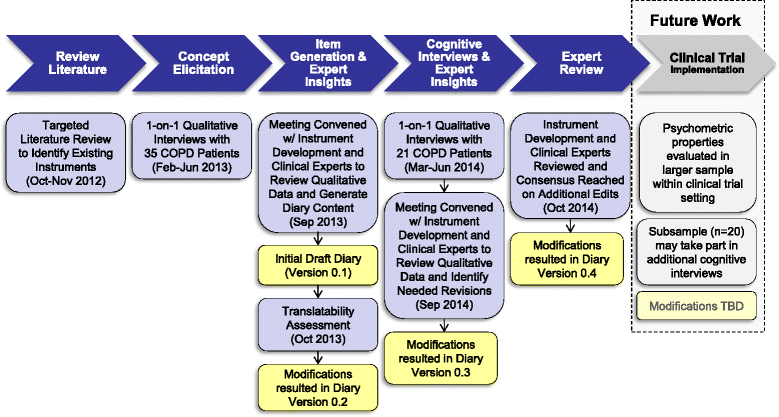Development of the chronic obstructive pulmonary disease morning symptom diary (COPD-MSD)
- PMID: 27424173
- PMCID: PMC4947344
- DOI: 10.1186/s12955-016-0506-7
Development of the chronic obstructive pulmonary disease morning symptom diary (COPD-MSD)
Abstract
Background: The morning tends to be the most difficult time of day for many patients with chronic obstructive pulmonary disease (COPD) when symptoms can limit one's ability to perform even simple activities. Morning symptoms have been linked to higher levels of work absenteeism, thereby increasing the already substantial economic burden associated with COPD. A validated patient-reported outcome (PRO) instrument designed to capture morning symptoms will allow for a more comprehensive approach to the evaluation of treatment benefit in COPD clinical trials.
Methods: A qualitative interview study was conducted among a sample of symptomatic adults with COPD. Concept elicitation interviews (n = 35) were conducted to identify COPD morning symptoms, followed by cognitive interviews (n = 21) to ensure patient comprehension of the items, instructions and response options of the draft COPD Morning Symptom Diary (COPD-MSD). All interview transcript data were coded using ATLAS.ti software for content analysis.
Results: Mean age of the concept elicitation and cognitive interview sample was 65.0 years (±7.5) and 62.3 years (±8.3), respectively. The study sample represented the full range of COPD severity (Global Initiative for Chronic Lung Disease [GOLD] classifications I-IV) and included a mix of racial backgrounds, employment status and educational achievement. During the concept elicitation interviews, the three most frequently reported morning symptoms were shortness of breath (n = 35/35; 100 %), phlegm/mucus (n = 31/35; 88.6 %), and cough (n = 30/35; 85.7 %). A group of clinical and instrument development experts convened to review the concept elicitation data and develop the initial 32-item draft COPD-MSD. Cognitive interviews indicated subjects found the draft COPD-MSD to be comprehensive, clear, and easy to understand. The COPD-MSD underwent minor editorial revisions and streamlining based on cognitive interviews and input from the experts to yield the final 19-item daily diary.
Conclusions: This study supports the content validity of the new COPD-MSD and positions the diary for quantitative psychometric testing.
Keywords: COPD; COPD-MSD; Morning; Patient-reported outcome; Symptoms.
Figures
Similar articles
-
[Reliability and validity of the chronic obstructive pulmonary disease morning symptom diary Chinese version].Zhonghua Jie He He Hu Xi Za Zhi. 2019 Jun 12;42(6):444-450. doi: 10.3760/cma.j.issn.1001-0939.2019.06.008. Zhonghua Jie He He Hu Xi Za Zhi. 2019. PMID: 31189231 Chinese.
-
Symptoms and markers of symptom severity in asthma--content validity of the asthma symptom diary.Health Qual Life Outcomes. 2015 Feb 13;13:21. doi: 10.1186/s12955-015-0217-5. Health Qual Life Outcomes. 2015. PMID: 25879643 Free PMC article.
-
Symptoms and impact of COPD assessed by an electronic diary in patients with moderate-to-severe COPD: psychometric results from the SHINE study.Int J Chron Obstruct Pulmon Dis. 2015 Jan 7;10:79-94. doi: 10.2147/COPD.S73092. eCollection 2015. Int J Chron Obstruct Pulmon Dis. 2015. PMID: 25609942 Free PMC article. Clinical Trial.
-
The development of a patient-reported outcome measure for assessing nighttime symptoms of chronic obstructive pulmonary disease.Health Qual Life Outcomes. 2013 Jun 25;11:104. doi: 10.1186/1477-7525-11-104. Health Qual Life Outcomes. 2013. PMID: 23799883 Free PMC article. Review.
-
COPD symptoms in the morning: impact, evaluation and management.Respir Res. 2013 Oct 21;14(1):112. doi: 10.1186/1465-9921-14-112. Respir Res. 2013. PMID: 24143997 Free PMC article. Review.
Cited by
-
The Relationship Between Morning Symptoms and the Risk of Future Exacerbations in COPD.Int J Chron Obstruct Pulmon Dis. 2020 Aug 5;15:1899-1907. doi: 10.2147/COPD.S255030. eCollection 2020. Int J Chron Obstruct Pulmon Dis. 2020. PMID: 32848378 Free PMC article.
-
The Development of a COPD Exacerbation Recognition Tool (CERT) to Help Patients Recognize When to Seek Medical Advice.Int J Chron Obstruct Pulmon Dis. 2022 Jan 21;17:213-222. doi: 10.2147/COPD.S337644. eCollection 2022. Int J Chron Obstruct Pulmon Dis. 2022. PMID: 35087270 Free PMC article.
-
Daytime symptoms of chronic obstructive pulmonary disease: a systematic review.NPJ Prim Care Respir Med. 2020 Feb 21;30(1):6. doi: 10.1038/s41533-020-0163-5. NPJ Prim Care Respir Med. 2020. PMID: 32081967 Free PMC article.
-
Frailty in COPD: Clinical Impact, Diagnosis, Biomarkers, and Management Strategies.Int J Chron Obstruct Pulmon Dis. 2025 Jul 15;20:2445-2458. doi: 10.2147/COPD.S522862. eCollection 2025. Int J Chron Obstruct Pulmon Dis. 2025. PMID: 40688238 Free PMC article.
-
Understanding data visualization techniques in qualitative studies used to develop and validate patient-reported outcome measures: a targeted literature review.Qual Life Res. 2025 Jul;34(7):2031-2048. doi: 10.1007/s11136-025-03964-5. Epub 2025 Apr 25. Qual Life Res. 2025. PMID: 40279025 Review.
References
-
- Bousquet J, Khaltaev NG, Cruz AA, World Health Organization . Global surveillance, prevention and control of chronic respiratory diseases: a comprehensive approach. Geneva, Switzerland: World Health Organization; 2007.
-
- Global Initiative for Chronic Obstructive Lung Disease (GOLD). Global strategy for the diagnosis, management, and prevention of chronic obstructive pulmonary disease. 2016 [http://goldcopd.org/global-strategy-diagnosis-management-prevention-copd...] Accessed 4 June 2016. - PubMed
Publication types
MeSH terms
LinkOut - more resources
Full Text Sources
Other Literature Sources
Medical


